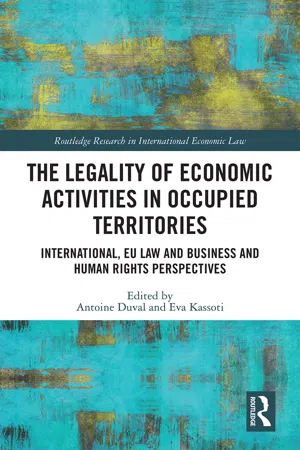
The Legality of Economic Activities in Occupied Territories
International, EU Law and Business and Human Rights Perspectives
- 256 pages
- English
- ePUB (mobile friendly)
- Available on iOS & Android
The Legality of Economic Activities in Occupied Territories
International, EU Law and Business and Human Rights Perspectives
About This Book
This edited volume explores the question of the lawfulness under international law of economic activities in occupied territories from the perspectives of international law, EU law, and business and human rights.
Providing a multi-level overview of relevant practices, policies and cases, the book is divided in three parts, each dealing with how different legal fields have come to grips with the challenges brought about by the question of the lawfulness under international law of economic activities in occupied territories. The first part includes contributions pertaining to the international law dimension of the question. It contains chapters on the conjunction between jus in bello, jus ad bellum and international human rights law in the context of exploitation of natural resources in territories under belligerent occupation; on third party obligations flowing from the application of occupation law in relation to natural resources exploitation; and on State practice with regards to trading with occupied territories. The second part focuses on EU law and contains contributions that assess the EU's approach to occupied territories and the extent to which this approach comports with the EU's obligations under international law; contributions providing an in-depth assessment of the case-law of the CJEU on occupied territories; as well as contributions pertaining to the political considerations that may influence the legal framing of questions pertaining to occupied territories. The final part focuses on the business and human rights perspective, with chapters on investment arbitration as a means for holding the occupant accountable for its conduct towards foreign investments and investors; on the role and impact of the soft law framework governing corporate activity (such as the UN Guiding Principles) on business involvement with occupied territories; as well as a final case study on the dispute involving Israeli football activity in settlements located in the OPT and the legal responsibility of FIFA in this regard.
The book will appeal to academics, practitioners and policy-makers alike.
Frequently asked questions
1 Exploiting natural resources in occupied territories – the conjunction between Jus in Bello, Jus ad Bellum and international human rights law
1 Introduction
2 Jus in Bello
Table of contents
- Cover
- Half Title
- Series Page
- Title Page
- Copyright Page
- Table of Contents
- List of contributors
- Preface – John Dugard
- Setting the scene: the legality of economic activities in occupied territories
- 1 Exploiting natural resources in occupied territories – the conjunction between Jus in Bello, Jus ad Bellum and international human rights law
- 2 EU trade relations with occupied territories: third party obligations flowing from the application of occupation law in relation to natural resources exploitation
- 3 Some state practice regarding trade with occupied territories: from the GATT to today
- 4 The EU’s trade relations with northern Cyprus obligations and limits under public international and EU law
- 5 EU labelling practices for products imported from disputed territories
- 6 The EU’s economic engagement with Western Sahara: the Front Polisario and Western Sahara Campaign UK cases
- 7 Western Sahara, the European Commission and the politics of international legal argument
- 8 Business actors in Western Sahara: heightened obligations and responsibilities under the UNGP?
- 9 Offside? Challenging the transnational legality of Israeli football activities in the Occupied Palestinian Territories
- 10 Investment tribunals adjudicating claims relating to occupied territories – curse or blessing?
- Index